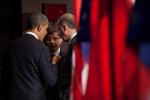Turkish Prime Minister Recep Tayyip Erdoğan comes to Washington at a time of domestic crisis over car bombings at Reyhanlı on the Syrian border that killed over 50 and resulted in hundreds of wounded, many seriously. The Turkish public, which has never supported Ankara’s tough line on President Bashar al-Assad, is alarmed. Syria was already going to be Topic 1 for Erdoğan’s May 16 meetings with President Barack Obama, but everything about the Syria conversation now takes on a different character for the Turkish leader – and the United States. The stakes are high.
The scene echoes that before Erdoğan’s visit to the White House in November 2007. In the run-up to that meeting with President George W. Bush and after it was publicly announced, Kurdistan Workers’ Party (PKK) terrorists carried out, over three out of four consecutive weekends, dramatic attacks on border towns and locations from northern Iraq. Casualties numbered in the dozens, and television news, whose cameras captured the scene and the perpetrators running back across the border, ran vivid footage of the carnage over and over. They seemed to say that Erdoğan’s US policy was bankrupt, that America had dragged Turkey into a deadly quagmire with the PKK through its intervention into Iraq, and the de facto safe haven the PKK enjoyed there, and that Washington-Ankara relations were in crisis. This was, of course, the PKK’s intent.
Flash forward to May 11, 2013 and the car bombings in Hatay province along the Syrian border. Despite Erdoğan’s early remarks that the attacks might relate to the PKK issue, the circumstances and information made available to date by Turkish authorities seem clearly to point to Syrian involvement or complicity. The PKK has long operated in the mountains and hills of Hatay, presumably liking their ready access to Syria. But its forces have just begun to withdraw from Turkey on the orders of its leader Abdullah Öcalan. While renegade PKK figures opposed to Öcalan’s currently conciliatory policy might seek to sabotage it—and the hardest hardliners areSyrian—car bombings have not generally been the organization’s modus operandi. It seems more likely that Damascus used another group with origins in Marxist-Leninist hostility to Turkey, the Revolutionary People’s Liberation Party–Front (DHKP-C), which also carried out the February 1 suicide bombing at the US embassy in Ankara.
The attacks have amplified the voices of Turks who for some time have thought that the government’s calls for Assad to go and open support for the armed opposition in Syria were dangerous for Turkey if not also wrong. Opinion polls show that a large share of the public has serious reservations about or opposes the government’s Syria policy. According to Turkish media, scattered protests have occurred in Reyhanlı and elsewhere. In the aftermath of the bombings , public complains and assaults on the 200,000-plus Syrian refugees living in Turkey apparently reached such a level that Foreign Minister Davutoğlu personally had to condemn them, call for restraint, and remind his country’s citizens that responsibility for the Reyhanlı attack lies in Damascus, not with Syrian refugees – or in Ankara’s policies. Though little reported in the West, it is a fact that many Turks believe that Erdoğan’s policy on Assad comes at Washington’s insistence—indeed, that he is on this matter at least a tool of the United States, which is now endangering Turkey and inflaming the whole Middle East.
Turkey’s 2011 break with Assad did follow months of encouragement by Secretary of State Hillary Clinton and other US leaders that it do so. Advisors to the Turkish leaders report dismay that Washington did not have a plan for what would happen once large numbers of countries had demanded that Assad step down—for a strategy to affect his departure. From their point of view, Washington, having been aggressive on Assad up to about August 2011, has since been too passive and too cautious. In private conversations this past February, senior Turks ironically looked back at the unilateralism and risk-taking they and others saw in Bush Administration foreign policy and said the Obama team had tilted too far in the other direction, defers too little to others, seems too preoccupied with risks, and is too seized with domestic issues and not enough in the international arena given the issues there and their importance for US and Alliance interests.
In November 2007, besides offering Erdoğan direct assistance and support in going after PKK terrorists in the northern Iraq redoubts, President Bush publicly declared the PKK “to be an enemy of Turkey, and enemy of Iraq, and an enemy of the United States.” That determination and the steady implementation of the strategy he and Erdoğan agreed in the Oval Office that November to helped defuse a crisis in US-Turkish relations, end the dangerously hostile relationship between Turkey and Iraqi Kurdish President Barzani over the PKK, and at least indirectly contributed to a situation where the PKK problem may at last be going away. Erdoğan comes to Washington now with another terrorist attack behind him that at least some Turks blame indirectly on the United States. He should get a similar helping hand—for the sake of US-Turkish relations and American national interests. President Obama should make an unequivocal statement of support for the security of our alliance partner Turkey, he should articulate as coherent and compelling a Syria strategy as possible, and he should use this to corral support from Turkey and others now to see that strategy through.
Ross Wilson is director of the Atlantic Council’s Eurasia Center and former ambassador to Turkey (2005-08) and to Azerbaijan (2000-03).
Photo credit: White House / Pete Souza
Image: obamaturkey.thumbnail.jpg
